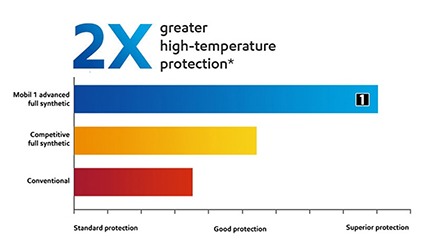Mobil 1™ – proven performance for turbochargers
Turbochargers are no longer just reserved for sports cars. By 2021, turbocharged engines could represent 38 percent of all new vehicles sold in the U.S., according to IHS Markit's "The Automotive Turbochargers Report." That means your next car – whether it’s a sedan or a light-duty truck – might have a turbocharger under the hood.
† US Environmental Protection Agency, March 2019, Highlights of Automotive Trends Report, analysis of 13 large global auto manufacturers.
Proper lubrication is critical in modern engines. Hear ExxonMobil engineers explain how turbochargers – in extreme operating conditions – create an extra boost of power for engines, and learn how Mobil 1™ lubricant technology provides two times greater high-temperature protection. *Results based on Honda Hot Tube testing.
Downsized and boosted: A revolution in engine design
Fuel economy and greenhouse gas regulations have changed the way engines are built; the Environmental Protection Agency has designated 54.5 miles per gallon (mpg) as the standard for automakers’ fleets in 2025. Due to a heightened focus on increasing mpg, smaller four-cylinder engines with complicated systems – hybrid, start-stop and turbo – are now replacing larger six- and eight-cylinder engines.
‡Regulations for Greenhouse Gas Emissions from Passenger Cars and Trucks, rulemaking announced August 2018.
Turbocharged engines have emerged as the answer to automakers’ needs to deliver fuel efficiency without sacrificing power. And turbocharger applications can benefit from the innovative properties of Mobil 1™ advanced full synthetic motor oil because they demand greater performance and protection. Mobil 1 motor oil provides outstanding turbocharged engine protection.§
§For Mobil 1™ ILSAC GF-5 products.
Benefits of turbochargers

Formulated for the extremes of turbocharged engines
Mobil 1 motor oil provides our best performance and protection from the punishing operating conditions of turbocharged engines.‡ Although turbochargers have several advantages, those advantages come with challenges – higher temperatures, higher rpm and greater compression. Hot exhaust gases blow directly through turbochargers, which drive the turbine fan, cause the turbine shaft to rotate rapidly and expose the entire turbine section to searing heat not found in other parts of the engine.
While engine crankshafts average about 3,000 rpm at highway speeds, the turbocharger shaft can reach speeds up to 200,000 rpm. Oil in a turbocharger can exceed temperatures of 400 degrees Fahrenheit, which is about twice the average heat of non-turbo engines. Such high temperatures can cause some motor oils to decompose, resulting in engine deposits and diminished performance. But Mobil 1 oils resist breakdown by delivering outstanding thermal and oxidation stability. When used in turbocharged applications, Mobil 1 oils offer outstanding:
- Protection of thrust bearing
- Varnish control on shaft bushing
- Deposit and buildup control on the compressor, compressor seal plate and turbo housing
Specially formulated to endure the additional stresses encountered in turbocharger applications, Mobil 1 oils deliver exceptional performance and protection at extreme temperatures – down to -40 degrees Fahrenheit and up to 500 degrees Fahrenheit.
High-temperature protection

*than conventional oil. Results based on Honda Hot Tube testing.
The motor oil industry uses the Honda Hot Tube test, which is a proprietary Honda high-temperature deposit test that measures an oil’s resistance to deposit formation in turbochargers. In the severe-service test with turbochargers, Mobil 1™ 5W-30 advanced full synthetic oil displayed superior protection compared to a competitive full synthetic oil as well as our own conventional oil (which met industry-standard GF-5/API SN requirements).
An industry leader in proven turbo performance
Mobil 1 oils are setting the standard for turbocharged engine performance and protection. For years, ExxonMobil has run its own Thin Film Oxidation Test, which simulates a turbocharger’s harsh operating environment. Oxidation stability, aging stability and viscosity control are even more important for thinly layered oils in turbocharged applications because today’s smaller turbocharged engines are generating more heat and power than ever before.
Thin film oxidation protection

The ExxonMobil Proprietary Thin Film Oxidation Test involves preheating the metal surface and the oil to high temperatures, and then continuously spraying the oil onto the metal surface. This test measures the oil’s ability to demonstrate varnish control within the high-temperature turbocharger environment. Oils with poor thermal stability will decompose, leaving behind a residue on the metal. Residue buildup could cause the temperatures inside the turbo to increase, eventually blocking oil passages and resulting in turbo failure.
More than 70 of the top performance vehicle models, many of which feature turbos, roll off factory lines with Mobil 1 motor oil inside. From Mercedes-AMG to Porsche, automakers use Mobil 1™ motor oil as the factory fill and recommended service fill to protect their modern turbocharged engines.
Changes in Formula 1® racing have also served to further prove the superior abilities of Mobil 1 oils. In 2014, teams had to transition from 2.4 liter V-8 engines to 1.6 liter V-6 hybrid turbo engines with energy recovery systems and fuel flow restrictions. The race team sponsored by the Mobil 1 brand depended on Mobil 1 oil to keep its turbocharged power units in top racing condition. So if there’s a turbocharger under your hood, Mobil 1 lubricant technology can help you get the most out of your engine. ||
||Mobil 1™ 5W-30 motor oil was evaluated against other commercially available ILSAC GF-5 motor oils in both field and engine testing designed to test motor oil performance in modern turbocharged engines.
